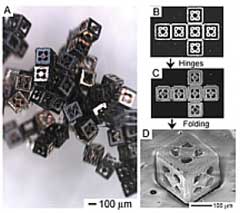Johns Hopkins researchers have devised a self-assembling cube-shaped perforated container, no larger than a dust speck, that could serve as a delivery system for medications and cell therapy.
Because of their metallic nature, the container’s location in the body could easily be tracked by magnetic resonance imaging.

“We’re talking about an entirely new encapsulation and delivery device that could lead to a new generation of smart pills,” said David H. Gracias. “The long-term goal is to be able to implant a collection of these therapeutic containers directly at the site or an injury or an illness.”
He believes the microcontainers could someday incorporate electronic components that would allow the cubes to act as biosensors within the body or to release medication on demand in response to a remote-controlled radio frequency signal.
The cubes are coated with a thin layer of gold, so that they are unlikely to pose toxicity problems within the body. They have not yet been implanted in humans or animals, but the researchers have conducted lab tests to demonstrate how they might work in medical applications.
Via boing Boing Eurekalert.







